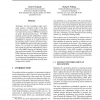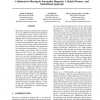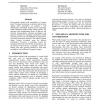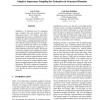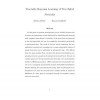UAI
2000
14 years 1 months ago
2000
Multi-agent games are becoming an increasingly prevalent formalism for the study of electronic commerceand auctions. The speed at which transactions can take place and the growing...
UAI
2000
14 years 1 months ago
2000
Qualitative probabilistic networks have been designed for probabilistic reasoning in a qualitative way. Due to their coarse level of representation detail, qualitative probabilist...
UAI
2000
14 years 1 months ago
2000
Techniques for plan recognition under uncertainty require a stochastic model of the plangeneration process. We introduce probabilistic state-dependent grammars (PSDGs) to represen...
UAI
2000
14 years 1 months ago
2000
We consider the problem belief-state monitoring for the purposes of implementing a policy for a partially-observable Markov decision process (POMDP), specifically how one might ap...
UAI
2000
14 years 1 months ago
2000
Cooperative games are those in which both agents share the same payoff structure. Valuebased reinforcement-learning algorithms, such as variants of Q-learning, have been applied t...
UAI
2000
14 years 1 months ago
2000
The securities market is the fundamental theoretical framework in economics and finance for resource allocation under uncertainty. Securities serve both to reallocate risk and to ...
UAI
2000
14 years 1 months ago
2000
The growth of Internet commerce has stimulated the use of collaborative filtering (CF) algorithms as recommender systems. Such systems leverage knowledge about the known preferenc...
UAI
2000
14 years 1 months ago
2000
Conversations abound with uncertainties of various kinds. Treating conversation as inference and decision making under uncertainty, we propose a task independent, multimodal archi...
UAI
2000
14 years 1 months ago
2000
Sampling is an important tool for estimating large, complex sums and integrals over highdimensional spaces. For instance, importance sampling has been used as an alternative to ex...
UAI
2000
14 years 1 months ago
2000
In this paper we present decomposable priors, a family of priors over structure and parameters of tree belief nets for which Bayesian learning with complete observations is tracta...

